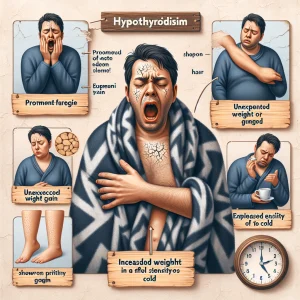Understand and Identify Key Signs and Symptoms of Hypothyroidism for Better Health
Hypothyroidism poses a significant threat to health and well-being, occurring when the thyroid gland fails to produce sufficient amounts of vital thyroid hormones. This butterfly-shaped gland, situated at the front of your neck, is essential for regulating a myriad of bodily functions, particularly metabolism, energy levels, and overall physiological balance. An underactive thyroid can trigger a series of physiological changes that impact nearly every system in the body. The primary hormones, thyroxine (T4) and triiodothyronine (T3), are crucial for sustaining appropriate metabolic rates. When their production is diminished, it can lead to severe drops in energy, unexpected weight fluctuations, and a general decline in health. Recognizing these implications is vital for understanding how this condition can influence various aspects of your life.
Numerous factors contribute to the development of hypothyroidism, including autoimmune disorders like Hashimoto’s thyroiditis, certain medications, past radiation treatments, or even an iodine deficiency. Being informed about the risk factors and symptoms associated with hypothyroidism is crucial, as this condition can dramatically impact your health and quality of life. Often dubbed the body's “metabolic engine,” a decline in thyroid function can result in noticeable metabolic disruptions, manifesting as weight gain, persistent fatigue, and other troubling symptoms. It's important to note that hypothyroidism is more prevalent in women and tends to increase with age. By identifying these signs and symptoms early, you can seek timely medical intervention and explore effective treatment options.
Gain In-Depth Understanding of Hypothyroidism: Essential Information and Insights
- Hypothyroidism is characterized by insufficient hormone production from the thyroid gland, resulting in a variety of physical and psychological symptoms that can significantly impact daily life.
- Common symptoms of hypothyroidism include fatigue, weight gain, dry skin, and increased sensitivity to cold, among others.
- Physical symptoms may also encompass hair loss, joint pain, and muscle weakness, all of which can severely hinder daily activities and overall quality of life.
- Emotional ramifications can include depression, anxiety, and difficulties in focus and concentration, which may exacerbate existing mental health challenges.
- Identifying hypothyroidism in children and adolescents can be especially difficult, as they may display symptoms such as growth delays, delayed puberty, or academic struggles.
- Diagnosis generally involves blood tests to evaluate levels of thyroid hormones and thyroid-stimulating hormone (TSH).
- Standard treatment options for hypothyroidism typically include synthetic thyroid hormone medications designed to compensate for the hormone deficiency.
- Incorporating lifestyle changes, such as a balanced diet, regular exercise, effective stress management, and prioritizing sleep, can greatly improve the management of hypothyroidism.
 Identify the Most Common Symptoms of Hypothyroidism in Your Daily Life
Identify the Most Common Symptoms of Hypothyroidism in Your Daily Life
Throughout your daily routine, you might encounter various symptoms that could signal an underactive thyroid. One of the most commonly reported issues among individuals with hypothyroidism is a persistent feeling of fatigue. Many affected individuals describe experiencing overwhelming tiredness, even after a full night’s rest, which can lead to diminished motivation and hinder daily tasks. This ongoing exhaustion not only adversely affects physical health but also disrupts emotional stability and overall productivity, potentially resulting in frustration and long-term health complications.
In addition to fatigue, unexpected weight gain is another typical symptom. Individuals may observe an increase in body weight despite adhering to a healthy diet and exercise routine. This frustrating weight gain often stems from a slowed metabolism caused by decreased thyroid hormone levels. Other accompanying symptoms may include heightened sensitivity to cold, dry skin, hair loss, and constipation. Recognizing these early warning signs is critical, as they pave the way for prompt medical evaluation and effective management of the condition.
Delve into the Physical Symptoms Associated with Hypothyroidism
The physical symptoms of hypothyroidism can vary widely and significantly impact your daily life. One frequently noted sign is a marked decline in skin and hair quality. Many individuals report experiencing dry, rough, and flaky skin, which can lead to discomfort and self-consciousness. Similarly, hair may become brittle and prone to falling out, raising concerns about personal appearance and self-esteem, which can further exacerbate mental health struggles.
Another physical symptom to be aware of is myxedema, characterized by swelling, particularly in the face or around the eyes. This condition arises from the accumulation of mucopolysaccharides in the skin, resulting in a puffy appearance that can be distressing. Additionally, muscle weakness and joint discomfort are prevalent complaints among those diagnosed with hypothyroidism. Stiffness and pain in muscles and joints can hinder participation in enjoyable activities. Thus, identifying these physical signs is crucial for understanding the broader implications of hypothyroidism on your overall health and quality of life.
Explore the Emotional and Mental Health Consequences of Hypothyroidism
Hypothyroidism has a profound impact not just on physical health but also on emotional and mental wellness. Many individuals contending with this condition often report experiencing feelings of depression or increased anxiety that seem out of proportion to their circumstances. You may find yourself grappling with continual sadness or a lack of motivation without any clear reason. If these emotional struggles persist, they can signal deeper effects of hypothyroidism on mental health that warrant attention.
Cognitive functions can also be significantly impaired, with many people describing symptoms associated with “brain fog.” This cognitive decline may manifest as difficulty concentrating, forgetfulness, and an overall sensation of mental sluggishness. Such challenges can disrupt your daily responsibilities, complicating tasks at home and in the workplace. Recognizing these emotional and cognitive symptoms connected to hypothyroidism is vital for obtaining the necessary support and treatment to enhance your overall quality of life.
 Detect Hypothyroidism Symptoms in Children and Adolescents Promptly
Detect Hypothyroidism Symptoms in Children and Adolescents Promptly
Hypothyroidism is not limited to adults; it can also have serious implications for children and adolescents, often manifesting differently than in adults. In younger populations, symptoms may not always be overtly evident. For instance, you might notice signs such as growth delays or difficulties focusing in school. These indicators may easily be misinterpreted as typical childhood behavior or common developmental delays, highlighting the importance of parents and caregivers remaining vigilant and proactive.
In addition to growth-related concerns, children diagnosed with hypothyroidism may display excessive fatigue or lethargy, which can impede their engagement in physical activities and social interactions with peers. Mood swings and irritability are also frequently observed, as hormonal imbalances can disrupt emotional stability. If you suspect your child exhibits symptoms indicative of hypothyroidism, it is essential to consult with a healthcare professional for a thorough evaluation and testing to ensure their health and development are closely monitored.
Recognize the Importance of Thyroid Function Tests for Accurate Hypothyroidism Diagnosis
The Essential Role of Thyroid Function Tests in Diagnosing Hypothyroidism
The journey to diagnosing hypothyroidism typically begins with thyroid function tests, which are crucial for evaluating the health of your thyroid gland. The most commonly conducted tests measure levels of Thyroid-Stimulating Hormone (TSH) and free thyroxine (T4). Produced by the pituitary gland, TSH plays a vital role in signaling the thyroid to produce T4. Elevated levels of TSH may suggest that the thyroid is underactive and unable to produce sufficient hormones, implying a higher likelihood of hypothyroidism.
Understanding Thyroid Test Results for Accurate Hypothyroidism Diagnosis
Simultaneously, assessing T4 levels is crucial for evaluating the severity of the hormonal deficiency. When blood test results reveal elevated TSH levels alongside low T4 levels, this combination typically confirms a diagnosis of hypothyroidism. Gaining insight into the intricacies of these tests can help ease concerns and provide clarity regarding your thyroid health, empowering you to make informed decisions about your treatment.
Empower Yourself with Knowledge About the Diagnostic Process for Hypothyroidism
Acquiring a deeper understanding of the diagnostic process not only enriches your knowledge but also empowers you as you navigate your healthcare journey. Being informed about the operations of thyroid function tests and what they reveal about your body facilitates more productive discussions with your healthcare provider, enabling proactive management of your health and overall well-being.
 Explore Comprehensive Treatment Options for Effective Management of Hypothyroidism
Explore Comprehensive Treatment Options for Effective Management of Hypothyroidism
Once diagnosed with hypothyroidism, a variety of treatment options are available to help you manage the condition effectively. The most commonly utilized strategy is hormone replacement therapy, which typically involves the administration of synthetic levothyroxine. This medication mimics the natural function of thyroid hormones, aiding in restoring normal hormone levels, alleviating symptoms, and enhancing overall well-being.
Your healthcare provider will collaborate closely with you to determine the appropriate dosage tailored to your specific needs and how your body responds to the treatment. Regular monitoring through blood tests is essential to ensure that your hormone levels remain within the desired range. Maintaining open communication with your healthcare team regarding any changes in your symptoms or potential side effects is critical for optimizing your treatment experience and achieving the best possible health outcomes.
Implement Lifestyle Changes for Optimal Management of Hypothyroidism
In addition to medication, making specific lifestyle changes can significantly improve your ability to manage hypothyroidism effectively. A well-balanced diet that prioritizes whole foods can support thyroid function and overall health. Incorporating nutrient-rich foods containing iodine, selenium, and zinc—such as fish, nuts, seeds, and leafy greens—can provide essential nutrients crucial for optimal thyroid performance and hormone synthesis.
Furthermore, engaging in regular physical activity is vital for maintaining a healthy weight and enhancing energy levels. Moderate exercise can help combat feelings of fatigue, elevate mood, and boost cognitive function, contributing to a comprehensive sense of well-being. Prioritizing sound sleep hygiene is equally essential; aiming for 7-9 hours of quality sleep each night is critical for supporting hormonal balance and overall health.
By thoroughly understanding hypothyroidism and its effects on both physical and emotional health, you empower yourself to take control of your well-being. With the right approach to diagnosis, consistent management strategies, treatment options, and lifestyle modifications, you can navigate this condition with confidence. Remember, you are not alone; seeking support from healthcare professionals and loved ones can greatly enhance your journey toward achieving optimal health.
Frequently Asked Questions About Hypothyroidism: Your Essential Guide
What are the most common symptoms associated with hypothyroidism?
Common symptoms linked to hypothyroidism include fatigue, weight gain, constipation, dry skin, hair loss, cold sensitivity, muscle weakness, and depression.
Can hypothyroidism lead to fluctuations in the menstrual cycle?
Yes, hypothyroidism can indeed cause changes in the menstrual cycle, which may present as irregular periods, heavy bleeding, or even missed periods altogether.
Is hair loss a frequent symptom of hypothyroidism?
Hair loss is a common symptom of hypothyroidism, typically appearing as thinning hair, brittle strands, or noticeable bald patches.
Can hypothyroidism contribute to weight gain?
Yes, hypothyroidism can lead to weight gain due to a slowed metabolic rate and possible fluid retention within the body.
What mental health symptoms are associated with hypothyroidism?
Mental health symptoms related to hypothyroidism may include depression, anxiety, irritability, and difficulties with concentration.
Can hypothyroidism lead to muscle weakness?
Yes, individuals affected by hypothyroidism often experience muscle weakness and discomfort, which can impede daily activities and exercise routines.
Is cold sensitivity a common symptom of hypothyroidism?
Yes, experiencing cold sensitivity is a typical symptom of hypothyroidism, often associated with a lower basal metabolic rate and reduced heat generation in the body.
Can hypothyroidism cause dry skin?
Yes, hypothyroidism can result in dry and itchy skin due to decreased oil production and sweating, leading to discomfort and irritation.
Presented BY: Hypothyroid Blood Tests
Hypothyroidism Symptoms: Key Signs to Recognise Was First Published By https://bloodtest.co.uk
Find Us On Facebook: EZ Blood Tests
The Article: Hypothyroidism Symptoms: Essential Signs to Identify appeared first on: https://ezbloodtest.com
The Article Hypothyroidism Symptoms: Key Signs You Should Recognize Was Found On https://limitsofstrategy.com
The Article Hypothyroidism Symptoms: Essential Signs to Identify First Appeared ON
: https://ad4sc.com

